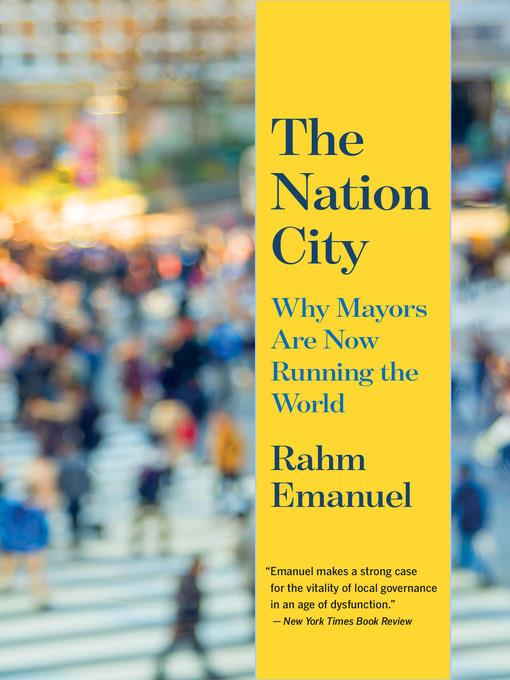
The Nation City
Why Mayors Are Now Running the World
کتاب های مرتبط
- اطلاعات
- نقد و بررسی
- دیدگاه کاربران
نقد و بررسی

December 1, 2019
The former two-term mayor of Chicago (2011-2019) and chief of staff for Barack Obama pens an eloquent tribute to the potential benefits of mayoral influence. Given his long history of public service, Emanuel (co-author: The Plan: Big Ideas for America, 2006), now a contributor to the Atlantic, could have penned a traditional memoir; instead, he focuses on duty and service rather than his own track record. The book is part memoir, part sociological study, and part road map to readers who may aspire to political office in the future. In these deeply partisan times characterized by widespread gridlock at the federal level, Emanuel argues that mayoral power, even if used via the "bully pulpit," can be more effective than the federal institutions that have failed in even their most basic responsibilities to their constituents. Sure, the author takes a few swipes at Donald Trump, noting that he dislikes cities because they represent qualities that he lacks: "They are progressive, smart, dynamic, inclusive, climate-aware, healthy, innovative and diverse, among other things." However, the narrative is far from a political screed and more of a manifesto about how communities can take care of themselves by concentrating efforts on the local level. After a brief history of mayoral influence in the United States, Emanuel offers microportraits of mayors who are changing their communities for the good worldwide, including Pete Buttigieg (South Bend, Indiana), Mick Cornett (Oklahoma City), and Sadiq Khan (London), as well as leaders in New Orleans, Houston, and Milwaukee. These men and women continue to meet their challenges head-on and seek solutions through innovation, partnerships, and civic cooperation. While it's true that most of the featured leaders are left-leaning progressives, the author also dedicates a chapter to fiscally and socially conservative mayors who are doing their jobs well. Emanuel has his detractors--who doesn't?--but he shines a compelling spotlight on that most elusive of ideals: hope.
COPYRIGHT(2019) Kirkus Reviews, ALL RIGHTS RESERVED.

December 9, 2019
City Hall is supplanting dysfunctional national government on everything from filling potholes to fighting climate change, according to this hype-heavy manifesto on municipal governance. Former Chicago mayor Emanuel, who served as White House chief of staff to President Obama, argues that city government impacts citizens’ well-being more than a “sclerotic, clumsy, inflexible, wounded, and weak” federal government mired in partisan gridlock and debt. He showcases mayors from around the country as they fix schools, build infrastructure, refinance pension funds, spruce up downtowns, boost civic spirit, pursue de-carbonization, and defy President Trump’s immigration policies. Touting his own mayoral accomplishments, Emanuel lists education reforms including free pre-K and free community college, energy-efficiency measures, police department innovations that lowered crime and reformed the department following controversial shootings, subway and airport upgrades, riverfront promenades, and a 2040 carbon-neutrality deadline. Emanuel may be right about the perils of national politics, but his municipal triumphalism—“bout a hundred cities around the world drive the economic, cultural, and intellectual energy of our planet”—yields little serious policy analysis, and in ascribing unemployment and crime drops to city initiatives, he ignores underlying factors like nationwide economic trends and demographic shifts. The result is an unconvincing case for small-bore localism over a broad national agenda.

January 31, 2020
Emanuel served as mayor of Chicago from 2011-19, and, before that, served in the U.S. House of Representatives and held varying positions in the Clinton and Obama administrations. In this work, he suggests that the answer to political division lies in governance at the city level, rather than the national level, and maintains that it is the work of mayors to effect long-lasting change. Using examples from his own experiences as well as success stories from other cities, Emanuel shows that true innovation is occurring at the local level, in large and small cities, and under Republican and Democratic mayors alike. These mayors are improving education, infrastructure, and environmental policy for their communities, stepping into areas that were traditionally the realm of federal government, but because the system is either bureaucratic or complex at the national level, it is up to local officials to make things happen. VERDICT While occasionally repetitive, Emanuel is uniquely positioned to offer this perspective, and it is rare to find a positive book about current politics. He presents a hopeful message that many need to hear.--Michael C. Miller, Austin P.L. & Austin History Ctr., TX
Copyright 2020 Library Journal, LLC Used with permission.

January 1, 2020
With national governments mired in dysfunction, who can fill the void to create solutions to society's pressing problems? Mayors, writes Emanuel, former hizzoner of Chicago and two-time presidential advisor. City leaders don't have time for partisan bickering. Their constituents demand pragmatic solutions, whether fixing potholes or improving social services, and hold their leaders accountable when they don't deliver. Emanuel breezily surveys the achievements of mayors such as Bill de Blasio, who enacted universal pre-K in New York City; Greg Fischer, who revamped Louisville's education system; and Anne Hidalgo, who upgraded Paris's transportation system in an effort to combat climate change. But most of all, Emanuel touts his own achievements: renovating O'Hare Airport, altering the school system, and luring corporate headquarters downtown, among others. It's a spun record, denuded of the controversy that marked much of his tenure, and predictably self-serving. Nevertheless, the book brims with the author's passion for the city's top job. At its best, Emanuel's chronicle offers a revelatory view into how mayors run cities, and provokes readers to ponder whether cities really might save the world.(Reprinted with permission of Booklist, copyright 2020, American Library Association.)

























دیدگاه کاربران